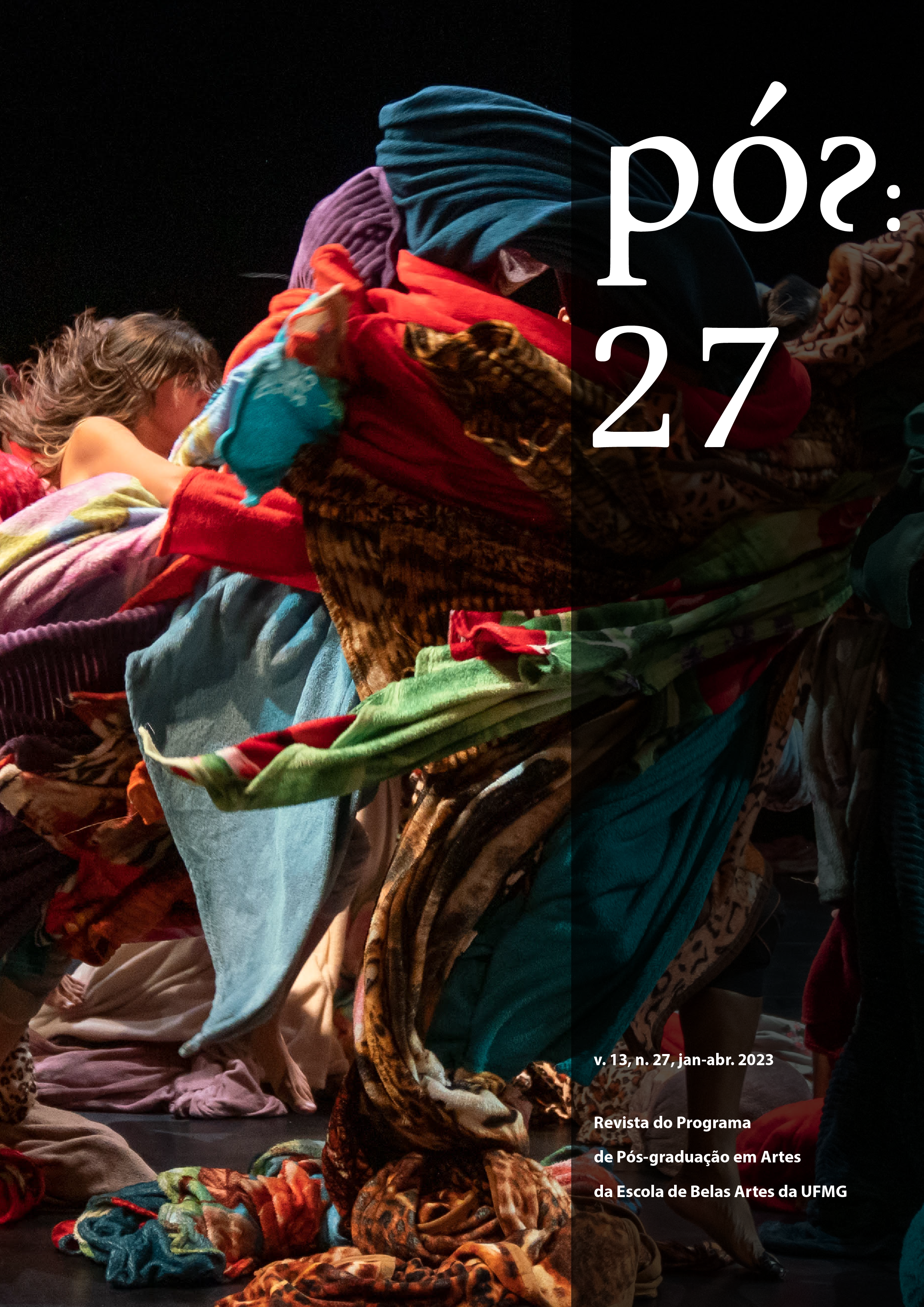Ator descartável e personagem em crise
gerenciamentos de elenco no cinema experimental
DOI:
https://doi.org/10.35699/2237-5864.2023.41655Palavras-chave:
Ator experimental, Elenco, Personagem, Cinema experimentalResumo
A personagem ficcional sofreu plenos processos de esvaziamentos e fragmentações durante o cinema no séc. XX. A intercambialidade atoral/de personagem estava entre os vários procedimentos cinematográficos experimentais do gerenciamento de elenco que evidenciavam essa crise da personagem. Este trabalho intenta analisar como esses procedimentos de intercambialidade atoral/de personagem se
manifestaram no cinema experimental durante quatro momentos em que eles aparecem com maior proeminência: a forma endurecida da obra de arte experimental; os vários registros do jogo do ator; a perda da autoridade do discurso e o estranhamento brechtiano.
Downloads
Referências
ABIRACHED, Robert. La crise du personnage dans le théâtre moderne. Paris: Gallimard,
AMIEL, Vincent. Le corps au cinema: Keaton, Bresson, Cassavetes. Paris: Presses
Universitaires de France, 1998.
AMIEL, Vincent et al. (dir.) Dictionnaire critique de l’acteur: théâtre et cinéma. Rennes:
Presses Universitaires de Rennes, 2012.
ASLAN, Odete. O ator no século XX: evolução da técnica/problema da ética. São Paulo:
Perspectiva, 1994. (Col. Estudos #119).
BASSAN, Raphael. Cinéma expérimental: abécédaire pour une contre-culture. Crisnée:
Yellow Now, 2014.
BERGALA, Alain. De l’impureté ontologique des créatures de cinéma. Trafic, Paris, n° 50, p.
-36, Qu’est-ce que le cinéma?, verão 2004.
BERGALA, Alain. L’invention de l’acteur moderne: conférence de Alain Bergala dans le
cadre des séminaires de l’Exception, du Café des images et du CDN, 06/02/2005. Disponível
em: https://www.cineclubdecaen.com/evenement/exception04.htm. Acesso em: 18 abr. 2016.
BOAL, Augusto. Teatro do Oprimido e outras poéticas políticas. 6. ed. Rio de Janeiro:
Civilização Brasileira, 1991.
BOAL, Augusto. O sistema coringa: uma experiência de Augusto Boal no Teatro Arena de
São Paulo. São Paulo: Visual Arte Comunicação, 1970. Disponível em:
http://augustoboal.com.br/wp-content/uploads/2017/11/coringa-port.pdf. Acesso em: 25 out.
BORDWELL, David. Figuras traçadas na luz: a encenação no cinema. Campinas: Papirus,
BORDWELL, David; STAIGER, Janet; THOMPSON, Kristin. The Classical Hollywood
Cinema: Film Style & Mode of Production to 1960. London: Routledge, 2005.
BRESSON, Robert. Notas sobre o cinematógrafo. São Paulo: Iluminuras, 2005.
CARVALHO, Ênio. História e formação do ator. São Paulo: Ática, 1989.
DEVILLE, Vincent. Les formes du montage dans le cinema d’avant-garde. Rennes:
Presses Universitaires de Rennes, 2014. (Col. “Le Spectaculaire”).
DYER, Richard. Stars. London: British Film Institute, 1998.
FERREIRA, Jairo. Cinema de invenção. São Paulo: Limiar, 2000.
GUIMARÃES, Pedro Maciel. Créer ensemble: l’apport des collaborations de création à
l’oeuvre de Manoel de Oliviera. 2009. 459 f. Tese (Doutorado) – Université Sorbonne
Nouvelle Paris 3, Paris, 2009.
LEHMANN, Hans-Thies. Postdramatic theatre. Abingdon: Routledge, 2006.
MITRY, Jean. Le cinema expérimental: histoire et perspectives. Paris: Editions Seghers,
METZ, Christian. L’énonciation impersonnelle, ou le site du film. Paris: Méridiens
Klincksieck, 1991.
NAREMORE, James. Acting in the Cinema. Berkeley/Los Angeles: University of California
Press, 1988.
NATIONAL GALLERY OF SCOTLAND. Disponível em: https://www.nationalgalleries.org.
Acesso em: 25 out. 2022.
NOGUEZ, Dominique. Éloge du cinéma expérimental. Paris: Éditions Paris Expérimental,
PASOLINI, Pier Paolo. Empirismo hereje. Lisboa: Assírio & Alvim, 1982.
PAVIS, Patrice. A análise dos espetáculos. São Paulo: Perspectiva, 2011.
PAVIS, Patrice. Le personnage romanesque, théâtral, filmique. In: PAVIS, Patrice. Vers une
théorie de la pratique théâtrale: voix et images de la scène. 3. ed. Lille: Presses
Universitaires du Septentrion, 2000. p. 143-154.
SARTRE, Jean-Paul. O existencialismo é um humanismo. In: SARTRE, Jean-Paul. Os
pensadores. Tradução de Rita Correia Guedes. São Paulo: Abril Cultural, 1984. p. 04-48.
SGANZERLA, Rogério. Por um cinema sem limite. Rio de Janeiro: Azougue Cultural,
SITNEY, P. Adams (ed.). The Avant-Garde Film: A Reader of Theory and Criticism. New
York: Anthology Film Archives, 1987. (Anthology Film Archives Series n. 3).
_____. Visionary film: The American avant-garde. New York: Oxford University Press, 1980.
SZONDI, Peter. Teoria do drama moderno (1880-1950). Tradução de Luiz Sérgio Repa.
São Paulo: Cosac & Naify, 2001.
THOMPSON, Kristin. Breaking the Glass Armor: Neoformalist Film Analysis. Princeton:
Princeton University Press, 1988.
TYLER, Parker. Underground Film: A Critical History. New York: Da Capo Press, 1995.
VOGEL, Amos. Film as a Subversive Art. New York: Random House, 1974.
WOLLEN, Peter. Semiotic Counter-Strategies: Readings and Writings. London: Verso,
WORTHEN, Willian. The Idea of the Actor. Drama and the Ethics of Performance.
Princeton: Princeton University Press, 1984.
Downloads
Publicado
Edição
Seção
Licença
Copyright (c) 2023 Sandro de Oliveira

Este trabalho está licenciado sob uma licença Creative Commons Attribution-NonCommercial 4.0 International License.
Autores que publicam nesta revista concordam com os seguintes termos:
- Autores mantém os direitos autorais e concedem à revista o direito de primeira publicação, com o trabalho simultaneamente licenciado sob a Creative Commons Attribution-NonCommercial 4.0 International License que permite o compartilhamento do trabalho com reconhecimento da autoria e publicação inicial nesta revista.
- Autores têm autorização para assumir contratos adicionais separadamente, para distribuição não-exclusiva da versão do trabalho publicada nesta revista (ex.: publicar em repositório institucional ou como capítulo de livro), com reconhecimento de autoria e publicação inicial nesta revista.
- Autores têm permissão e são estimulados a publicar e distribuir seu trabalho online (ex.: em repositórios institucionais ou na sua página pessoal) a qualquer ponto antes ou durante o processo editorial, já que isso pode gerar alterações produtivas, bem como aumentar o impacto e a citação do trabalho publicado
- É responsabilidade dos autores a obtenção da permissão por escrito para usar em seus artigos materiais protegidos por lei de Direitos Autorais. A Revista PÓS não é responsável por quebras de direitos autorais feitas por seus colaboradores.












